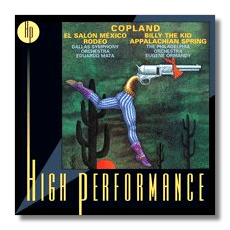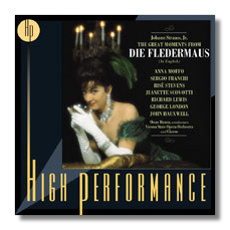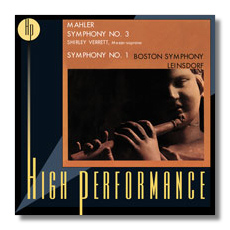
The Internet's Premier Classical Music Source
Related Links
- Latest Reviews
- More Reviews
-
By Composer
-
Collections
DVD & Blu-ray
Books
Concert Reviews
Articles/Interviews
Software
Audio
Search Amazon
Recommended Links
Site News
 CD Review
CD Review
RCA High Performance

Aaron Copland
- Billy the Kid
- Appalachian Spring
- Rodeo
- El Salón México
Philadelphia Orchestra/Eugene Ormandy
Dallas Symphony Orchestra/Eduardo Mata
RCA High Performance 09026-63467-2 ADD 76:16


Johann Strauss II
Die Fledermaus (highlights)
- Anna Moffo (Rosalinda)
- Sergio Franchi (Alfred)
- Risë Stevens (Orlofsky)
- Jeanette Scovotti (Adele)
- Richard Lewis (Eisenstein)
- George London (Falke)
- John Hauxvell (Frank)
Vienna State Opera Orchestra & Chorus/Oscar Danon
RCA High Performance 09026-63468-2 ADD 49:24


Gustav Mahler
- Symphony #1 in D Major (1888)
- Symphony #3 (1895)
Shirley Verrett, mezzo-soprano
Boston Boychoir
New England Conservatory Choir
Boston Symphony Orchestra/Erich Leinsdorf
RCA High Performance 09026-63469-2 ADD 2CDs 71:58, 73:32
These are the most recent releases in BMG Classics' High Performance series, a follow-up to the Living Stereo line that features memorable performances and outstanding digital remasterings of recordings that usually sounded pretty good to begin with.
Subtlety is the distinguishing characteristic of the Copland reissue. Both Ormandy and Mata take the time to find something new to say about these familiar scores. Appalachian Spring and Billy the Kid elicit a thoughtful response from Ormandy; the music almost sounds sad in both works, but in different ways. In the former, the conductor helps us to feel the uncertainty of rural life and marriage. In the latter, Ormandy characterizes the charismatic outlaw as a loner, who is never so comfortable as when he is in the wide-open spaces of the West, spaces that are as lonely as he is. The famous "Gun Battle" section is electrifying. (These recordings were made in 1969.) Mata opens up the orchestral textures and blows life into Rodeo and El Salón México; the results glow with a gentle, pulsating light. There's plenty of excitement to be had in Rodeo, but what one remembers about this reading is Mata's close but unfussy control over orchestral colors. El Salón México is even more refined. Mata has removed every whiff of vulgarity from this score, even from the clarinet solos, which are so dirty in this work's earliest recordings. Not everyone will like such refinement, but there's no denying that Mata's surprisingly aristocratic treatment is refreshing. These two recordings were made in 1978, right at the end of the analog era, and they sound splendid in these new remasterings. Ormandy's recordings sound hardly less fine. The annotations include Philip Ramey's interesting interview with the composer.
The reissue of this goofy Die Fledermaus is a surprise. Mel Mandel and Norman Sachs give it in a free, and often excessively wordy, English adaptation that more often than not comes across as arch. This recording, which was made in 1963, is given a firm center by Danon's idiomatic conducting, and by the Vienna State Opera and Chorus, who must have been nonplussed by this Anglicized version of their national treasure. George Gerhardt, the recording's original producer, also deserves credit for making sense of its disparate parts. The glamorous Anna Moffo is in fine voice for Rosalinda, and if she doesn't reach the ideal level of fantasy in her Act Two song about Hungary, blame it on the English text. As Prince Orlofsky, Risë Stevens doesn't get much to do, but she sings her couplets with a huge voice and an equally huge personality. The only problem with Jeanette Scovotti's Adele is her trill, which really is more of a rattle; otherwise, she is the typical soubrette. Among the tenors, Sergio Franchi's tongue-in-cheek Alfred leaves the most lingering impression. (Franchi was the "pop" tenor of the 60s, taking the reins from Mario Lanza for a time.) Richard Lewis, whom I had pegged as an oratorio singer, does surprisingly well as the weaselly Eisenstein; it was clever to contrast him with Franchi. As Frank, John Hauxvell has too little to sing to leave much of an impression, and as Falke, George London has even less. Sparkling sound quality is another one of this recording's attractive qualities. It's a very short CD, however.
It is unfortunate that Erich Leinsdorf didn't record more of Mahler's symphonies. He and the Boston Symphony Orchestra taped the First, Third, Fifth, and Sixth Symphonies for RCA Victor, and now all except the Sixth are available on CD. All of them are fine recordings. Leinsdorf brings Old World objectivity to the First and Third Symphonies, which were recorded in 1962 and 1966, respectively. He conducts with drama, tenderness, and imagination, and he doesn't distort or sensationalize the music. (Perhaps a little expressive distortion would have been welcome in the third movement of the First Symphony, but Leinsdorf's innate good taste prevented him from going that far.) The Third probably is one of the most difficult of Mahler's symphonies to pace and shape; Leinsdorf keeps it from middle-age spread. The final movement often strikes me as just sentimental, but it is genuinely moving here. A young Shirley Verrett excels in her solos, and the choral work is fine. The Boston Symphony Orchestra's brass section shines in both symphonies, but particularly in the Third, where the offstage effects are expertly done. There are several worthwhile recordings of the Third Symphony, and many of the First, yet this recording can compete with the best of them, not just because of the performances, but also because of the sound. The original LPs were impressive and the dynamic range and frequency response heard on this digital remastering are as good as anything to be found on CD.
Copyright © 2000, Raymond Tuttle




















